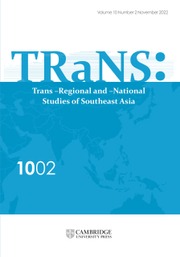Article contents
Decoding Vietnam's Foreign Policy After the Thirteenth National Party Congress: Process, Continuity, and Adjustment
Published online by Cambridge University Press: 18 October 2022
Abstract
As the third decade of the twenty-first century begins, Vietnam embarks on a more advanced phase of national development and international integration, with a greater emphasis on foreign policy as part of the country's overall national defence and development strategy. This informs greater expectations about shifts in Vietnam's foreign policy perception and discourse in pursuit of national interests and the regime's legitimacy amidst major domestic and international developments. This article analyses the making, in terms of processes and actors, and the evolution, in terms of themes and directions, of Vietnam's foreign policy under the Thirteenth National Congress of the Communist Party of Vietnam, which was held in early 2021. The article argues that while embedding continuity with what the country has been pursuing since its renovation process (known as Doi Moi) started in the mid-1980s, Vietnam's foreign policy under the Thirteenth Party Congress is crafted on a broader base of domestic consensus and features new dimensions, implying stronger domestic support for Hanoi's conduct of foreign affairs and a Vietnamese nation brand with greater visibility and contribution in the regional and global arenas in the coming years.
- Type
- Original Article
- Information
- TRaNS: Trans-Regional and -National Studies of Southeast Asia , Volume 11 , Issue 1 , May 2023 , pp. 89 - 101
- Copyright
- Copyright © The Author(s), 2022. Published by Cambridge University Press on behalf of Institute of East Asian Studies, Sogang University
Footnotes
The views expressed are the authors’ own and do not necessarily reflect those of the institutions they work for.
References
- 1
- Cited by



